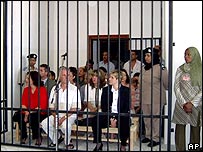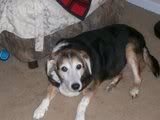From CTheory.
-
George W. Bush as Presidential Simulacrum
"..In Jerzy Kozinsky's 1970 novel Being There, a character named Chance the Gardener, whose entire existence has been restricted to watching television shows and tending a walled garden, is suddenly thrust into the outside world. Here he acquires admirers who rename him Chauncey Gardiner, mistake his ignorance for profundity, and take his horticultural allusions for zenlike koans. His intellectual limitations and personal inadequacies become social and political virtues. At the end of the novel, the President's advisors gather to consider a candidate to replace the current vice-president. One of them suggests Chance. "Gardiner has no background," he declares. "And so he's not and cannot be objectionable to everyone! He's personable, well-spoken, and he comes across well on TV" [1]. Although Being There is over 30 years old, it is eerily pertinent to the current political scene. Only in one respect was Kozinski's prophecy too cautious. Writing during the reign of the uncharismatic, unphotogenic, yet canny and intelligent President Nixon, Koskinski was apparently unable to imagine Chance as a sitting president.."
"..After the press conference of April 13, 2004, for example, one television reporter acknowledged that Bush had spoken "clumsily" at times, but speculated that the president's plain speech is part of his appeal, that he uses the idioms of ordinary Americans. Other commentators approved his evident "conviction" about the war in Iraq -- referring to moments when Bush uttered the clichés about freedom with apparent vehemence. On the April 13th, 2004, edition of Hardball, Chris Matthews expressed his admiration for Bush's refusal to acknowledge any responsibility or any mistakes -- a bizarre encomium, considering the long and embarrassing moments when Bush slouched down the side of the podium, grinning and stammering, unable to think of any response, as if a computer virus had infected his personal software.
On the following day, the New York Times lead editorial characterized the president's performance as follows: "Mr. Bush was grave and impressive while reading his opening remarks, but his responses to questions were distressingly rambling and unfocused."[7] The use of "impressive" seems precisely calibrated to ward off the blow of "distressingly." None of the commentators mentioned the ingratiating smile that constantly played about the President's lips, a nervous and inappropriate aspect of his demeanor, particularly considering the serious content of the reporters' questions. No one referred to the software glitch, and it was not shown again, let alone played repeatedly -- unlike other moments televised in 2004, such as Howard Dean's "scream" and Janet Jackson's bared breast.."
"..When I argue that Bush is not "real," I do not mean that he was manufactured in a secret factory, owned by a corporation like the Karp Cartel and controlled by a powerful conspiracy. But I will speculate that in a post-literate, hyperreal world, those accretions of historical time and psychological reflection that produce subjectivity tend to disperse before they constitute a deep, coherent self. The result can be a personality like that of Bush -- intellectually narrow, emotionally shallow, working with an abridged vocabulary, like a novice in a foreign language class. He is a commodity produced by contemporary American culture, with its bizarre admixture of consumerism, television, worship of celebrities, and glib Christian fundamentalism. Other cultures in other periods have produced personalities limited in different ways -- the provincial peasant, for example, who has never been more than a mile from his birthplace. Unlike the peasant, the contemporary flat personality knows that other countries, other cultures, other religions exist -- but in his solipsism they remain "unreal" to him, mere delusions to which other people, themselves mere figments, display an irrational attachment.."
-
Labels: Being nothing, Being There




































